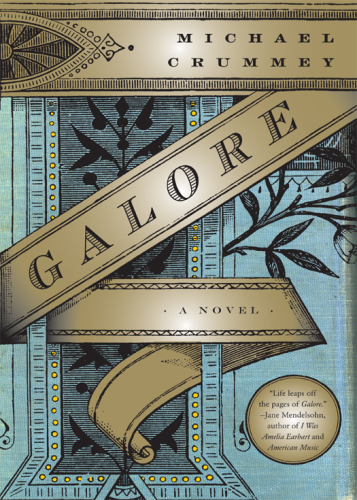
Galore
A Novel
کتاب های مرتبط
- اطلاعات
- نقد و بررسی
- دیدگاه کاربران
نقد و بررسی

Starred review from January 3, 2011
Crummey (River Thieves) returns readers to historic Newfoundland in his mythic and gorgeous latest, set over the course of a century in the life of a hardscrabble fishing community. After a lean early-19th-century winter, a whale beaches itself and everyone in town gathers to help with the slaughter. But when a woman known only as Devine's Widow—when she's not called an outright witch—cuts into the belly, the body of an albino man slides out. He eventually revives, turns out to be a mute, and is dubbed Judah by the locals. Judah's mystery—is his appearance responsible for the great fishing season that follows?—is only one among many in this wild place, where the people are afflicted by ghosts and curses as much as cold and hunger. Crummey's survey eventually telescopes to the early 20th century, when Judah's pale great-grandson, Abel, sequesters himself amid medical debris in an old hospital where his opera singer cousin, Esther Newman, has returned and resolved to drink herself to death. But before she does so, she shares with him the family history he never knew. Crummey lovingly carves out the privation and inner intricacies that mark his characters' lives with folkloric embellishments and the precision of the finest scrimshaw.

January 15, 2011
Ghosts, gangsters, mermen and a Christ-like healer who emerges from the belly of a beached whale are among the attractions in a boisterous, one-of-a-kind folk epic about feuding intermarried clans in Newfoundland.
Acclaimed Canadian bestseller Crummey (The Wreckage, 2005, etc.) lays on colorful language and antic humor in capturing the first settlements established in remote Newfoundland at the beginning of the 19th century. An unshakable enmity has existed between the English Protestant Sellers family and the Irish Catholic Devine family since the matriarch known as Devine's Widow turned down a marriage offer from King-me Sellers (a town tyrant named not for any regal qualities, but his fondness for checkers). Branded a witch, she has made the most of her supposed supernatural powers in antagonizing him and his clan over the years. When the whale coughs up the otherworldly Judah (named by the coastal dwellers out of confusion with Jonah), life gets even more oddly eventful for all concerned. Though pale, foul-smelling and speechless, he has a positive effect on everyone whose path he crosses. This novel loses much of its offbeat charm when Crummey turns to the contentious effects of union organizing during World War I; in doing so, he drains the book of its laughter and bawdy charm. But the singular world he creates is special. For American readers, the peculiarities of Newfoundland (aka "The Rock"), which even many Canadians see as a strange and exotic place, will seem magical.
A lively, eccentric, mythmaking novel inspired by 200 years of Canadian history.
(COPYRIGHT (2011) KIRKUS REVIEWS/NIELSEN BUSINESS MEDIA, INC. ALL RIGHTS RESERVED.)

Starred review from February 1, 2011
Set in Paradise Deep, Newfoundland, this novel chronicles the intertwined lives and loves of two families, the uncanny Devines and the gentrified Sellers, over two centuries. Crummey's prose is glorious throughout, unflinchingly honest and unsentimentally magical. Here, supernatural episodes and anecdotes share the page with naturalistic descriptions of people, physical afflictions, weather, and landscape, and the veil separating life and death is nigh transparent. "Now the once," utters one character near the novel's conclusion, beautifully conveying how past and future meet in the present, a notion Crummey subtly emphasizes by opening and closing the novel with miraculous accounts and linking inhabitants of Paradise Deep to totems--a Bible, a whale carcass--that persist from one generation to the next as they diminish. The effect is dazzling. VERDICT Newfoundland author Crummey's award-winning third novel, published in Canada in 2009, affirms that our lives are always astonishing. It's been justly compared to Gabriel Garcia Marquez's One Hundred Years of Solitude. It also calls to mind Graham Swift's Waterland and Alexis Wright's Carpentaria, as well as William Faulkner's epic Compson novels, and will appeal to readers who enjoyed those works.--J. Greg Matthews, Washington State Univ., Pullman
Copyright 2011 Library Journal, LLC Used with permission.

April 15, 2011
In his prizewinning third novel, Canadian writer Crummey (River Thieves, 2002; The Wreckage, 2005) delivers a dense, sprawling tale of two families bound together by love, secrets, fate, and a mysterious stranger. When the inhabitants of a tiny, isolated coastal town in nineteenth-century Newfoundland discover a beached whale, they believe their troubled fishing and oil season may have ended. But as they begin dismembering the whale, theyre surprised to find a man inside. More surprisingly, the man, soon dubbed Judah, is alive. In a town in which the only priest is a carousing drunk who owns a partial Bible, and a man dressed as a horse can foresee the future, no one is sure what to make of the stranger. Is he cursed? Is he a godsend? One thing is certain: nothing will remain the same. Spanning two centuries of Canadian history and presented in Garc-a Mrquezinspired magic realism fashion, Crummeys ambitious story of immigrant settlement, family alliances and clashes, heroism and failure is deeply moving and disquieting, sure to make some waves.(Reprinted with permission of Booklist, copyright 2011, American Library Association.)

























دیدگاه کاربران